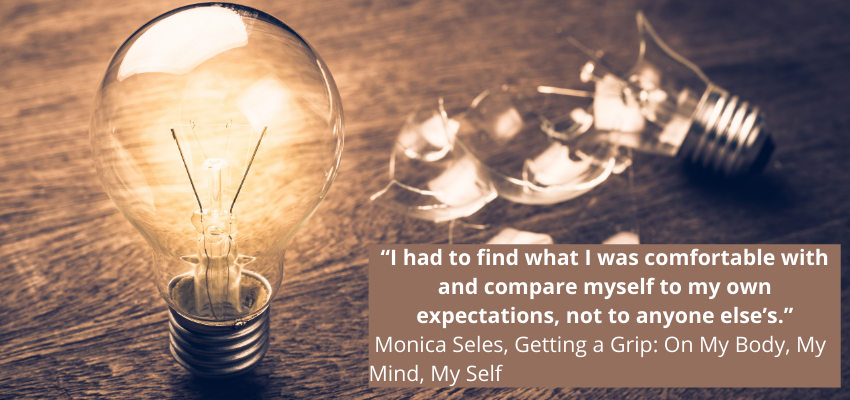 by Darius E. Bennett, Esq.
by Darius E. Bennett, Esq.
“I had to find what I was comfortable with and compare myself to my own expectations, not to anyone else’s.”
— Monica Seles, Getting a Grip: On My Body, My Mind, My Self
A former teen prodigy, Monica Seles finished her tennis career a 9-time major champion, an Olympic silver medalist, and among other remarkable accomplishments, a highly-influential tennis icon. In fact, tennis greats Venus Williams, Serena Williams, and Lindsay Davenport –each a legend in her own right– have referenced Monica as a career influence. Yet even Monica transited periods of life during which she compared herself –quite harshly—against the achievements of others. Particularly, while Monica did experience fulfillment as a tennis athlete, she did not feel an equal sense of satisfaction with regard to her physical appearance. Indeed, she struggled mightily with the notion that she did not have the carriage and physique of an athlete and would far too often compare her own appearance to that of other women in athletics or fitness. The effects were deleterious, and she would later end her career physically injured and fairly diffident. It was during retirement that Monica discovered the method for inoculating herself against the disease of comparisons: “Focus on your own mission, I told myself.”
What if we understood, at the start of all endeavors, that what we feed grows and what we starve dies?
It was first semester, junior year of high school when I became taken with stage acting. By that year, I had completed most of the major courses required for high school graduation, but still had elective requirements to fulfill. I chose theatre because I did not have the patience for the kind of art that required painting or drawing, could not afford the equipment and supplies for photography, and because I had little interest in learning to build bookshelves in woodshop. I took my first acting class expecting it would be low-stress and fun, simply because it seemed unlikely to be equal to the stressful, high-level math courses I had already taken. Unexpectedly, my connection to acting was immediate, and by the end, I invested far more energy and interest in being “great” at acting than I had imagined. As an adult, I would later learn through counseling that acting during those high school years provided an expedient for masking my anxiety. Quite simply, while I was embodying the person that emerged from a playwright’s imagination, I could not also be myself; there was no space for two people in those moments during which I brought a character to life. In short, unwittingly, I loved acting because it allowed me to be someone else. I could hide from myself; I could hide myself. Consequently, my interest in acting turned from miniscule to enormous in a matter of weeks. My life became academics, part-time work at the local video store, and the uncontainable joy of acting!
Along with everything I owned, I carried that ardor for stage work with me when I moved away to college. In college, I quietly and secretly balanced competing interests: course work toward becoming an attorney and course work toward abandoning my childhood dream of becoming an attorney so that instead I could become an actor. I found the theatre on campus and joined the college players (player: a pretentious way actors describe their art). I also acquired more formal training, squeezing in theatre electives between courses in politics and Spanish literature. I was a camellia in full bloom. I even kept abreast of recent plays when I moved off campus to Santiago, Chile for a semester abroad.
But when I returned to campus, there was a new stand-out actor, who contained within his person more charm and ability than an entire troupe of actors! He might have been taller, but definitely had curlier, more theatrical hair than I. He seemed to possess a level of ability that I had lost in my semester away, and thus the comparisons began, but in my own head. I began to behave poorly. I goaded friends and fellow actors into describing ways that my abilities might be more adept than his, and indirectly solicited assurances that I deserved certain roles more than he, that I was the better fit for those characters. While behaving this way, I stopped growing as an actor. I brought the same shallowness to fictitious characters that I was beginning to exhibit in my own life. My “competitor” and I were not equals because both he and I were focused on him, and only he could grow from that. As he flourished, I declined, and rightly earned that diminution induced through wrong focus. Eventually, I would be required to watch him from the wings. I, a withering star gazer that had somehow deprived itself of nourishment. So too had I undernourished my ambitions to become an actor, and they faded quicker than they had emerged.
I carried this hard-earned lesson forward into adulthood, although I must admit that it was a lesson I would repeat as a young attorney. Even still, those repeat offenses served as aides-memoire rather than being disquieting cases of first impression, and I was a quick learn the second time around. I knew that my growth depended on me, was in no way predicated on others’ perfect aims or errant misses and could only be achieved when I fed my focus and starved comparisons.

